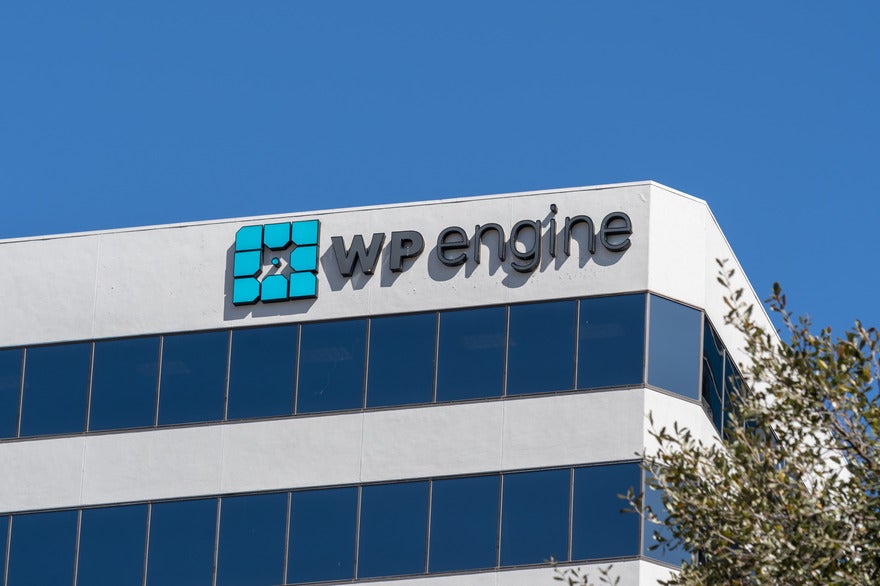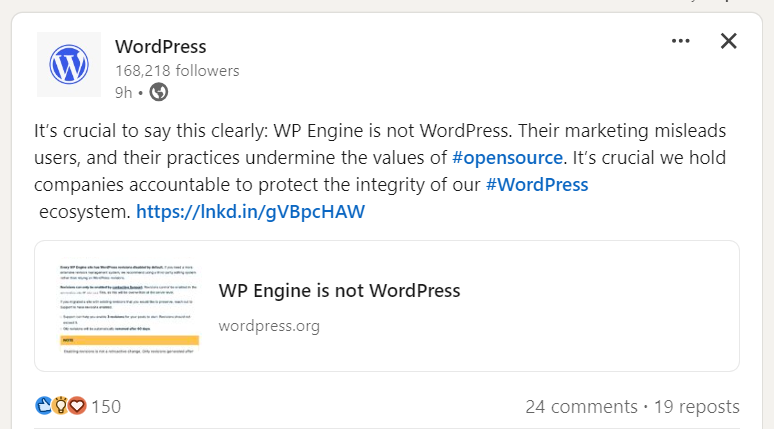WordPress and WP Engine Battle It Out: What Went Wrong?
If you click to purchase a product or service based on our independent recommendations and impartial reviews, we may receive a commission. Learn more

WordPress.org recently banned WP Engine – a company that provides WordPress hosting – from accessing its resources for free. Despite WP Engine labelling itself as the “Most Trusted WordPress Platform”, the two platforms are battling it out.
Matt Mullenweg, the co-founder of WordPress.org and CEO of Automattic (the company that owns WordPress), sparked outrage at the recent WordCamp US conference after calling WP Engine a “cancer to WordPress.” This triggered a series of events that exposed real unrest between WordPress and WP Engine.
What’s Going On?
Here’s a quick timeline of the events so far:
- September 2024: WP Engine is accused of trademark infringement but doesn’t comply with the demands from WordPress
- September 20, 2024: Mullenweg makes negative comments towards WP Engine at WordCamp US which causes backlash
- September 23, 2024: WP Engine sends a cease and desist letter to Automattic following Mullenweg’s statement
- September 25, 2024: WP Engine and its users are banned from using WordPress resources
- October 2, 2024: WP Engine files a federal lawsuit against Automattic and Matt Mullenweg
- October 4, 2024: Automattic pays employees who disagree with the company’s battle against WP Engine to leave – roughly 8.4% of the company have taken the deal (either $30,000 or six months of pay)
You can read more about the WP Engine vs WordPress feud in our detailed timeline of their rocky relationship.
Watch the full WordCamp stream in the video below to see where it all started – Mullenweg’s keynote speech begins at roughly the 7:08:10 mark:
The WordPress community is uneasy following the back-and-forth, with many arguing that Mullenweg’s actions are harmful and unnecessary. WordPress has maintained its position, declaring that WP Engine has profited off WordPress and its open-source project since many users believe the two are linked. An easy mistake considering the similar names and the fact that Automattic has previously invested money in WP Engine.

WP Engine has spoken out against Mullenweg’s claims, with the cease and desist letter being sent to demand that “Automattic and its CEO Matt Mullenweg stop making and retract false, harmful and disparaging statements against WP Engine.” The letter, available to read online, claims:
“In the days leading up to Mr. Mullenweg’s September 20th keynote address at the WordCamp US Convention, Automattic suddenly began demanding that WP Engine pay Automattic large sums of money, and if it didn’t, Automattic would wage war against WP Engine.”
WP Engine continues to fight back following the ban, describing on X that the company remains “steadfastly committed to supporting WP Engine customers, users, and the entire WordPress community.”
Does This Affect Your Site?
Should you boycott WP Engine? Do you need to choose an alternative hosting provider? During this turbulent time, WordPress has made it pretty clear that you shouldn’t rely on WP Engine for your hosting needs, particularly because WP Engine disables revisions. In fact, a recent post from its blog stated:
“If you want to experience WordPress, use any other host in the world besides WP Engine. WP Engine is not WordPress.”
WordPress has advised that any WP Engine customer who needs support should reach out to WP Engine directly.
With the issues ongoing, it’s unclear what will happen between WordPress.org and WP Engine. For now, the mood remains heated.


Leave a comment